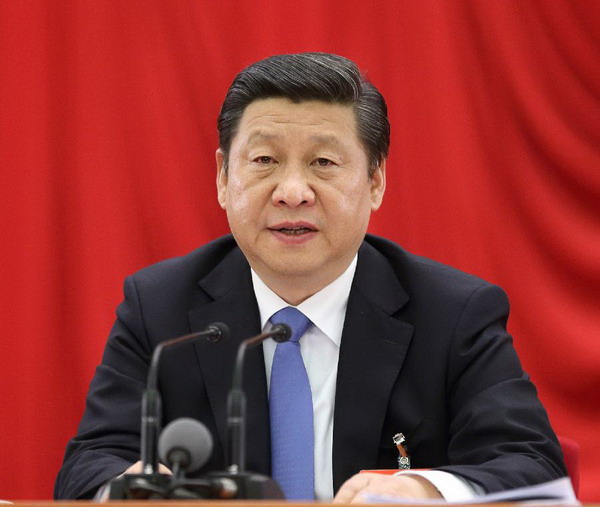A lighter government hand on the market will release greater economic vitality and enable sustainable growth
China's decision to give the market a decisive role in the distribution of resources and other factors of production, as outlined in the guideline document released at the conclusion of the Third Plenum of the 18th Central Committee of the Communist Party of China, is expected to help the world's second-largest economy release some new dividends for economic growth.
As part of a long-anticipated top-level reform roadmap, the session vowed to take "marketization" as the core, break up institutional hurdles that have handcuffed national development, and promote redistribution of capital, land and other factors of production.
Past experiences show that reforms in any country must advance with the times; they are never finished once and for all. And when past reforms become an obstacle to the country's economic and social development, they have negative instead of positive effects. After more than thirty years of fast development since the adoption of the reform and opening-up policy in 1978, China needs to draw up and enforce a new reform road map to tackle a series of thorny issues that now loom large.

|
As a matter of fact, marketized reforms have been the main line that China has abided by from the onset of its reforms. After the 1992 inspection tour of the southern regions by the architect of China's reform and opening-up initiative, Deng Xiaoping, a series of key reform measures were successively adopted, from the tax-sharing system and restructuring of rigid State-owned enterprises to the commercialization of the housing market and the adoption of the arable land protection system. Such market-based reforms have offered enormous vitality and space for China's sustainable and fast economic growth in the following decades.
But despite the need for new reforms, some people hope to maintain the current coexistence of administrative interventions in the market and economic activities under full market rules to maximize their vested interests. Such a "double-track" status quo has resulted in the existence of the entrenched industrial monopoly and the barriers of industrial regulations on one hand and disorderly competition as the result of the lack of effective and high-efficient regulations on the other.
China's dualistic economic system is closely related to the orientation of the government's role. The establishment of its all-powerful government has enabled the country to be quick in mobilizing national resources, which has contributed much to its rapid growth over the past decades.
However, the crux of the problem is that excessive administrative intervention into economic activities has already put the government in a position higher than the market. Some local governments are continuously trying to expand their presence in economic activities, which has further squeezed the space for the growth of the still-fledgling market. The government's direct interventions in or regulation of the microeconomy or its undercover subsidies to State-owned enterprises have to some extent resulted in it taking the market's role and the dysfunctional distribution of resources.
While expanding its role in some economic fields, the government has failed to build a sound and healthy market and play its due role in the provision of such public services as social security, education and housing. Just like a dysfunctional market, the government's failure to play its proper role has caused social chaos and lowed the efficiency of the national economy.
It has become a consensus throughout society that China's long-awaited economic structural adjustments should be realized through resources redistribution and improved efficiency and this undoubtedly must rely on market forces.
With the decline of its demographic dividend and rising production costs, China needs to further deepen marketized reforms of its labor, resources, the interest and exchange rate regime, among other things, in a bid to boost efficiency through deregulation of some factors of production. All these, however, inevitably entail the government's self-reform and its delegation of more power downward, including reform of its long-controversial fiscal and financial systems, as well as SOEs and government functions.
To raise the efficiency of its financial resources distribution, the government should push for a new round of fiscal, financial and taxation reforms to change the excessive flow of credit to government projects, SOEs, large firms or traditional sectors, while leaving less powerful private and some small and medium-sized enterprises in desperate need of funds. The large-scale credit flow to the housing market and government-sponsored projects over the past years has seriously squeezed the development of the real economy and such kind of misdistribution of financial resources should be reversed.
On one hand, the country should accelerate steps toward interest rate marketization, direct financing and other financial institutional reforms. This will help prevent the prospering financial sector from going awry of real economic demands and promote unblocked circulation of social funds within the official financial system. On the other hand, the outlay responsibilities between the central and local governments should be redefined to clear obstacles for a new round of fiscal and tax reforms.
When it comes to SOEs, reforms should aim to improve the efficiency of their distribution of resources through deepening reform of the State assets management system. Measures should also be taken to promote the merger of transregional and cross-ownerships to eliminate backward production, break up resources and power monopoly, build a fair and open competition order and environment and change the past low-efficient capital distribution partly caused by government interventions.
Despite a strong signal for sweeping self-reforming measures, whether the Chinese government can really define its relations with the market and delegate more of the responsibilities it has exercised in the past to the market and non-governmental players will remain the key to success.
The author is an associate research fellow with the China Center for International Economic Exchanges.
(China Daily 11/16/2013 page5)